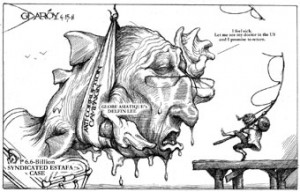Oily
SINCE ABOUT the time President Aquino took his oath of office, pump prices of both diesel and unleaded gasoline have jumped up by some P12 per liter. In other words, since July last year, pump prices for diesel have increased by around one-third, and unleaded gasoline by about one-fourth. As of this week, pump prices are at their highest since September 2008. The worst part is, we can only expect more increases in the near future.
 It is true that the situation is largely beyond the President’s, or indeed any administration’s, control. The so-called Arab Spring, the series of political protests that are sweeping through the Middle East and North Africa, has disrupted oil supply and fostered economic uncertainty—“causing,” in the words of the April 12 resolution of the Metro Manila regional wage board, “extraordinary increases in the prices of crude oil and local petroleum products.” The devastating earthquake-tsunami-nuclear-crisis that struck Japan last month has also contributed to the uncertainty. Since most of the country’s oil needs are still supplied by imports, the volatile world market has greatly impacted local conditions.
It is true that the situation is largely beyond the President’s, or indeed any administration’s, control. The so-called Arab Spring, the series of political protests that are sweeping through the Middle East and North Africa, has disrupted oil supply and fostered economic uncertainty—“causing,” in the words of the April 12 resolution of the Metro Manila regional wage board, “extraordinary increases in the prices of crude oil and local petroleum products.” The devastating earthquake-tsunami-nuclear-crisis that struck Japan last month has also contributed to the uncertainty. Since most of the country’s oil needs are still supplied by imports, the volatile world market has greatly impacted local conditions.
It isn’t true, however, that there is little that the administration can do to protect the public from the continuing spike in oil prices.
Article continues after this advertisementIn the first place, the administration can reconsider its position on the value-added tax imposed on petroleum products. The President has explained that removing the VAT on oil prices will only generate more demand for oil products, thus fueling more increases; other critics say removing the VAT will benefit only the middle class. But if, say, the diesel pump price reaches P50 a liter (something that can happen in a matter of days), removing the 12-percent VAT will bring the price down only to P44—still much higher than prices last July, and still high enough as to discourage increased consumption. The middle class too deserves a break, but surely providing this form of VAT relief to buses and so-called FXs will have an impact beyond the middle class. The proposal, we wish to emphasize, is only for the VAT to be waived when oil prices reach a certain level; the objective, again, is not to encourage more consumption, but only to provide relief to those who already pay too much for what they already consume.
The administration can continue its experiment in direct price subsidies. The Pantawid Pasada fuel assistance program has not even gotten off the ground, and already it is being criticized, not on legitimate economic reasons, but for polemical purposes. The program will give jeepney drivers a subsidy equivalent to P35 a day, while tricycle drivers will receive a smaller subsidy amounting to P5 a day. This week’s latest round of price increases (the 12th this year alone) is said to offset any gains from the program, even before its May 2 launch. But the administration must stay the course; the amounts may look minuscule, but—if the experiment succeeds—it may still have an appreciable impact.
Not least, the administration can exercise a greater sense of skepticism when it comes to dealing with the major oil companies. This is not merely a populist proposal, aimed at drawing a contrast (and driving a wedge) between Malacañang and the oil companies. But consider: it is always intriguing, during volatile periods, to find pump prices in various gasoline stations converging toward the same, higher, price level. A layman can only wonder: Do all these companies pay the same costs to bring their products to the market? Take the leaking FPIC pipeline that has been in the news for several months, for instance. The justification offered for the use of such a pipeline has always included economic factors; it is supposed to be cheaper, in the long run. But are Shell pump prices in fact cheaper than those of its competitors? There may be a perfectly legitimate reason for this regularly occurring phenomenon of converging high prices—but the consuming public needs to know exactly why and wherefore, and the administration can lead the way by opening up the oil companies’ books.
Article continues after this advertisementThere are no perfect solutions, and some of the old tried-and-tested measures are too familiar as to be unremarkable (such as, for example, mounting a major energy-savings campaign). But governments are elected not only to put their campaign promises into action, but also to respond quickly, creatively, to crises not of their own making.
















